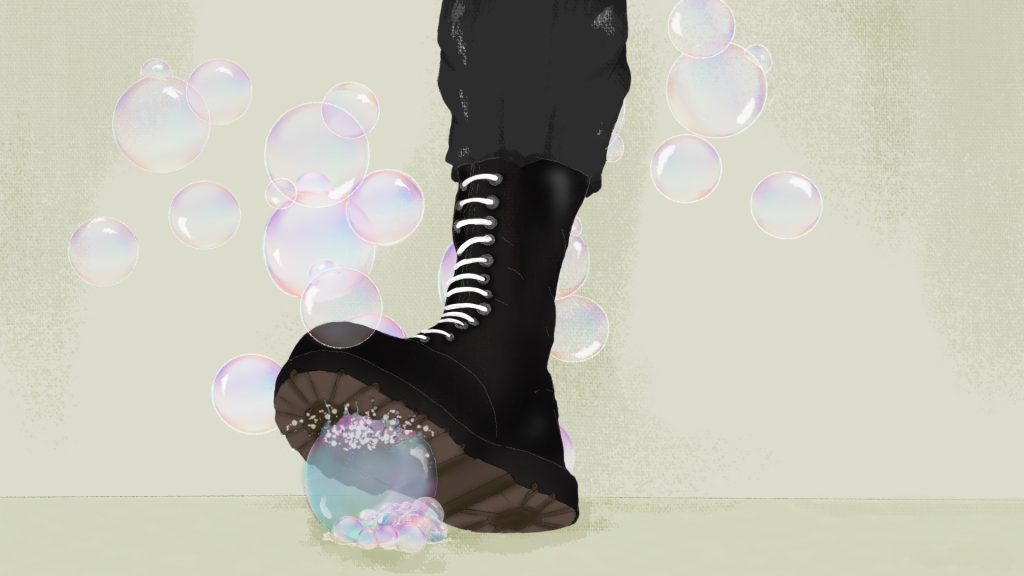Fostering ‘white wellbeing’
Kohne is a sandy-haired, well-groomed man in his early 40s. Hate movement watchers like Beirich consider him a key figure in the white nationalist streaming and podcasting ecosystem.
He’s claimed on his shows that he’s been a “pro-white advocate” since he was a preteen in the early 1990s, but he seemingly started gaining recognition across the wider white nationalist world from 2017 to 2018 when he began livestreaming and uploading videos of himself monologuing, often while driving, to social media under the name NoWhiteGuilt. Eventually, he abandoned the car in favour of a home studio and started writing books as well.
Little is known about his private life because, as he has explained in livestreams, he avoids sharing details to minimise his risk of being doxxed. But based on public records leaked by two disgruntled white nationalists, Barry and other researchers believe Kohne is a prison guard – or at least was at some point – and was briefly a co-defendant in a lawsuit over the 2006 asphyxiation death of an inmate. Kohne and other guards named as co-defendants with the prison were dropped from the suit on procedural and technical grounds.
He claims he once corresponded with William Luther Pierce III, a physics professor turned neo-Nazi who in 1974 founded the National Alliance, which became the premier US white supremacist group but faded after Pierce’s death in 2002.
Pierce also published The Turner Diaries in 1978, a story about white nationalists rising up against the supposedly Jewish-controlled US government through attacks that spiral into a world war, a white nationalist victory, the genocide of all nonwhite peoples and executions of white “race traitors”. Timothy McVeigh, the perpetrator of the 1995 Oklahoma City bombing, handed copies of the book out to friends. Elements of McVeigh’s attack directly mirrored the text.
In 2019, Kohne praised Pierce’s contributions to white people and mused about “how tall will [his] statue be when we regain our destiny”.
Kohne describes “antiwhitism” as the “greatest threat facing Western civilisation”. Antiwhite policies, according to him, include efforts to address historic racial injustices and embrace equity and diversity, which he sees as abandoning “excellence”; media coverage of violent white nationalist rallies, which he claims are staged by “antiwhite” interest groups to demonise white people and justify attacks against them; and depictions of interracial relationships, which he sees as promoting “miscegenation” and “white erasure”.
But unlike more stereotypical white nationalists, Kohne usually avoids slinging slurs at other races or calling for violence. “No race is the enemy, and genetics don’t make you virtuous,” he argues. Members of other races can be “pro-white”, he adds, and thus allies, just as white people can promote “antiwhitism” and thus be foes.
Instead, he argues, white people need to give up on mainstream institutions that supposedly fail or harm them and turn inward to foster what he calls “white wellbeing”.
Nurturing a sense of “purpose, safety and happiness” within insular white communities, he believes, will create a wall of inner and communal strength that “antiwhite” forces cannot penetrate, helping white people reclaim the power he believes they’ve lost.
Those ideas have an audience: Kohne has amassed tens of thousands of followers on Facebook, Twitter, Instagram, Gab, Telegram, Spreaker and more niche right-wing platforms as well as several sites he operates. In 2018, he became a regular contributor to the weekly livestream show of Mark Collett, who founded PA, the prominent British far-right group, in 2019. Collett invited Kohne to speak at PA’s first major conference in 2020.
Simi, who has followed Kohne’s career since about 2020 says “his approach to white nationalism is gaining salience” even if it’s unclear whether he is gaining prominence as a leader.
By 2019, No White Guilt flyers, banners and signs began to crop up in towns and at protests across the US. In 2022, a community of “White Wellbeing” advocacy groups emerged on social media, amplifying Kohne’s rhetoric. In 2023, an independent game-development studio, Dynostorm, announced it was working on a game reportedly based on Kohne’s ideas. Previews suggest that it involves players killing atheists, journalists and furries to save Western civilisation. And in 2024, his followers created a Foundation for White Wellbeing to facilitate giving money to Kohne and his allies.
Kohne’s rise coincided with a wave of backlash against traditional, aggressive, outward-looking white nationalist groups and figures after the Unite the Right rally in Charlottesville, Virginia in 2017, one of the largest white nationalist gatherings in recent US history.
Members of a wide array of far-right groups, including open white nationalists, gathered in the city to protest against the planned removal of a Confederate statue and find ways to unify their movements. The rally descended into violent clashes with counterprotesters and reporters.
The rally’s aftermath triggered a series of investigations into far-right groups, including RAM, and spurred social media platforms, online payment processors, web hosts and other services to ban far-right groups and individuals linked to them. These blows led white nationalists to re-evaluate how to organise and present themselves, explains Kurt Braddock, a professor at American University in Washington, DC, who studies white nationalist rhetoric.
Some moved towards “accelerationism”, the idea that seemingly random acts of racial violence by decentralised cells that are unable to sell each other out if their members are arrested can trigger enough unrest to bring about a power vacuum for white nationalists to then fill. The Christchurch mosque shooter, who killed 51 people and injured more than 40 in New Zealand in 2019, referenced accelerationism in writings before the attacks.
But many white nationalists turned inward, focusing on strengthening their own communities while making themselves seem innocuous, even acceptable, to outsiders. Kohne’s language exemplifies this trend, explains Barry, who’s monitored the far-right ideologue’s content for several years.
Kohne has also made clear that he wants to appeal to an audience that has traditionally been sidelined within white nationalist movements by creating a way for them to “contribute”: women.








